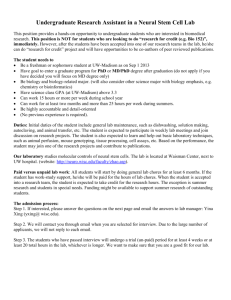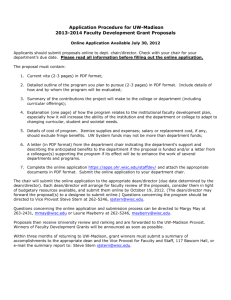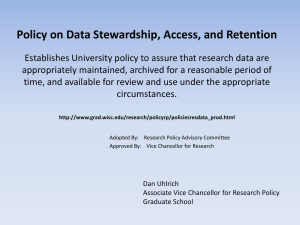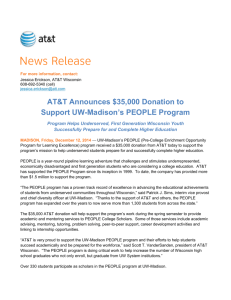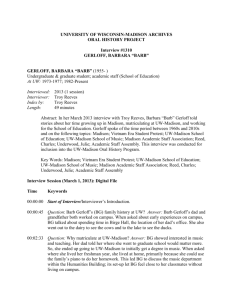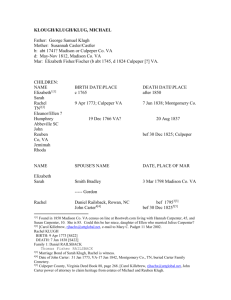Program - University of Wisconsin Law School
advertisement
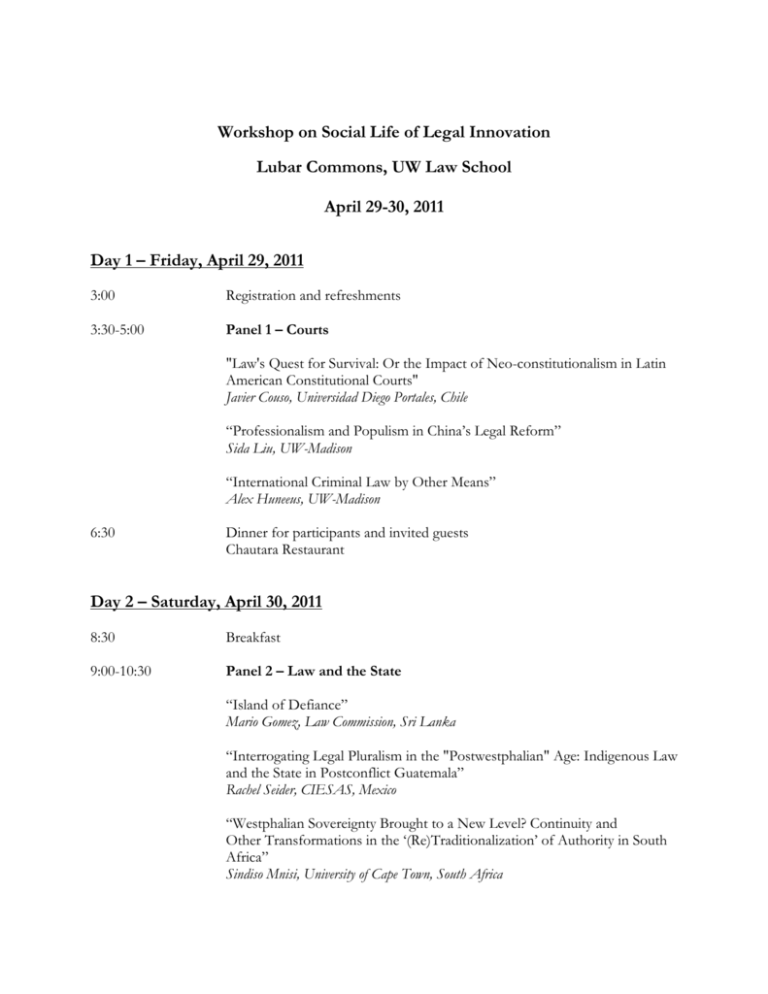
Workshop on Social Life of Legal Innovation Lubar Commons, UW Law School April 29-30, 2011 Day 1 – Friday, April 29, 2011 3:00 Registration and refreshments 3:30-5:00 Panel 1 – Courts "Law's Quest for Survival: Or the Impact of Neo-constitutionalism in Latin American Constitutional Courts" Javier Couso, Universidad Diego Portales, Chile “Professionalism and Populism in China’s Legal Reform” Sida Liu, UW-Madison “International Criminal Law by Other Means” Alex Huneeus, UW-Madison 6:30 Dinner for participants and invited guests Chautara Restaurant Day 2 – Saturday, April 30, 2011 8:30 Breakfast 9:00-10:30 Panel 2 – Law and the State “Island of Defiance” Mario Gomez, Law Commission, Sri Lanka “Interrogating Legal Pluralism in the "Postwestphalian" Age: Indigenous Law and the State in Postconflict Guatemala” Rachel Seider, CIESAS, Mexico “Westphalian Sovereignty Brought to a New Level? Continuity and Other Transformations in the ‘(Re)Traditionalization’ of Authority in South Africa” Sindiso Mnisi, University of Cape Town, South Africa 10:30-10:45 Break 10:45-12:15 Panel 3 – Transnational Legalism “Climate Change and State Responsibility: Devising a Novel Liability Regime for Global Environmental Problems” Sumudu Atapattu, UW-Madison “Theorizing Infrastructure Development Finance: Toward A New Accountability Rubric” Shalanda Baker, UW-Madison “Vertical and Horizontal Perspectives on Transnational Legalism: Examples from Thailand" David Engel, University at Buffalo Law School, New York 12:15-1:30 Lunch 1:30-3:00 Panel 4 - Governance “How Nations Share: The Role of Law in Creating and Resolving International Tax Disputes” Allison Christians, UW-Madison “Governance, Globalization and the Emergence of a Neo-Westphalian Order” Heinz Klug, UW-Madison “Global Governance, Indigenous Peoples, and the Right to Prior Consultation in Social Minefields" Cesar Rodriguez, University of the Andes Law School, Colombia 3:00-4:00 The Way Forward Heinz Klug & Alex Huneeus UW-Madison Biographies of Speakers Sumudu Atapattu is the Associate Director of the Global Legal Studies Center at the University of Wisconsin Law School. She teaches International Environmental law and her book entitled Emerging Principles of International Environmental Law was published by Transnational Publishers in 2006. She holds an LLM and a PhD Degree from University of Cambridge and is an Attorney-at-law of the Supreme Court of Sri Lanka. Sumudu is also the Lead Counsel for Poverty and Human Rights at the Center for International Environmental Law, Montreal, Canada. Before coming to the United States, she was an Associate Professor at the Law School, University of Colombo and Consultant, Law & Society Trust, Colombo. Her research interests include human rights and environment, climate change, environmental migration and sustainable development. Email: saatapattu@wisc.edu Shalanda Baker received her B.S. from the United States Air Force Academy and her J.D. from Northeastern University School of Law. She served as an Air Force officer prior to her honorable discharge under the "Don't Ask, Don't Tell" policy, and has since advocated for repeal of the policy. During law school, Shalanda was awarded a Rappaport Honors Program in Law and Public Policy Fellowship. She also served as President of the Black Law Students Association and a member of the Queer Caucus. She received the Massachusetts Black Judges Award for her law school achievements. Shalanda also worked as a legal extern to federal district court judge Martin Jenkins in the Northern District of California and a summer associate at Bingham McCutchen LLP, Boston. She also served homeless and low-income GLBTQ youth as an intern at the Peter Cicchino Youth Project of the Urban Justice Center in New York. Following her graduation, Shalanda clerked for Justice Roderick Ireland of the Massachusetts Supreme Judicial Court. She also worked as a corporate and project finance associate for Bingham McCutchen LLP, initially in Boston and later in Japan. Shalanda’s research interests include economic development, commercial finance, and the intersection of international development, privatization, and finance in the Global South. Her teaching interests include contracts, business organizations, bankruptcy, and commercial law. Email: shbaker@wisc.edu Allison Christians joined the University of Wisconsin Law School faculty in 2005. She received her J.D. from Columbia University School of Law and her LL.M. in Taxation from New York University School of Law. Prior to joining the faculty of the UW Law School, Professor Christians taught J.D. and LL.M. courses in federal and international income taxation at Northwestern University School of Law, and before that practiced tax law at Wachtell, Lipton, Rosen & Katz in New York, where she focused on the taxation of domestic and cross-border mergers and acquisitions, spin-offs, restructurings and associated issues and transactions involving private and public companies. Professor Christians has written several articles and book chapters addressing national and international policy, globalization, competition, institutional, and development aspects of taxation, she is co-author of a leading casebook on U.S. international tax law, and she serves as Editor for the Tax Section of Jotwell, the legal scholarship review blog. She teaches courses on Federal Income Taxation; International Taxation; Taxation of Business Entities and Tax Policy. Email: achristians@wisc.edu Javier Couso is Professor of Law and Sociology at the Universidad Diego Portales, in Santiago, Chile and former Director of the Center of Socio-Legal Research. During Fall 2006, Professor Couso was a Tinker Visiting Professor at UW Law School and organized with Professor Alexandra Huneeus a conference on “Legal Culture and the Judicialization of Politics in Latin America.” The papers presented at the conference were accepted for publication by the Cambridge University Press. Professor Couso’s research interests include the study of law and courts in Latin America, the comparative study of judicialization, and the legal profession. Email: javier.couso@udp.cl David Engel is SUNY Distinguished Service Professor at University at Buffalo Law School and teaches courses on Torts and Products Liability and seminars on Injuries and on Law, Culture, and Society as well as a Directed Readings Course for General LL.M. students. His research deals with law and society in the United States and in other countries, particularly Thailand, where he has lived, worked, and taught for many years. Professor Engel currently serves as chair of UB's Council on International Studies and Programs, an advisory body to the Provost. From 1991 to 2001, he served as Director of the Baldy Center for Law and Social Policy and as Vice Dean for Interdisciplinary Studies; and from 2002 to 2008 he was Director of International Programs at the law school. His latest book is Tort, Custom, and Karma: Globalization and Legal Consciousness in Thailand (2010), which is a study of injuries and the law in a rapidly changing Asian society. Professor Engel is an active member of the Law & Society Association, an international membership organization which he served as President from 1997-1998. He was also a member of the Advisory Panel of the National Science Foundation Program for Law and Social Sciences and the LSAC Grants Sub-Committee. In 2005/6, he was selected as the inaugural occupant of the Sturm Distinguished Visiting Chair at the University of Denver Sturm College of Law. Email: dmengel@buffalo.edu Mario Gomez (LL.B; LL.M; Ph.D) is a Member of the Law Commission of Sri Lanka and a Visiting Lecturer in the University of Colombo. He was previously a full time faculty member at the University of Colombo where he taught administrative law, constitutional law, jurisprudence, and women's rights at undergraduate and graduate levels. He has published in the areas of public law, economic and social rights, women's rights, human rights commissions, internally displaced persons and public law. He has designed and conducted training programs for judges, human rights activists, and staff of human rights commissions. He was a Post-Doctoral Fellow at Harvard University in 2001/2002. He works as an independent human rights lawyer and is currently the Lead Researcher for a National Integrity Study for Transparency International, and is leading a study on land rights in eastern Sri Lanka. Email: adomario@live.com Alexandra Huneeus is Assistant Professor of Law and Legal Studies at UW-Madison. She studies the judicialization of politics, the politics of human rights, and legal culture in Latin America. Her Ph.D. dissertation centered on the Chilean judiciary’s changing attitude towards cases of Pinochetera human rights violations. She teaches sociology of law, human rights, Latin American legal institutions, and international law. Before joining the UW faculty in 2007, Professor Huneeus was a fellow at Stanford University’s Center on Democracy, Development and the Rule of Law. She received her Ph.D. from U.C. Berkeley (2006), and her J.D. from Boalt Hall, the Berkeley Law School (2001). As a human rights fellow at the International Human Rights Clinic at Boalt Hall in 2004, she supervised students bringing a case before the Inter-American Court of Human Rights. The successful challenge resulted in a ruling ordering the Dominican Republic to alter its citizenship policies and practices. She also worked on the case against Augusto Pinochet in Chile and Spain, through the Center for Justice and Accountability in San Francisco. Prior to her turn to law, Professor Huneeus worked as an editor and journalist in Santiago, Chile, her native city, and in San Francisco, her home town. Email: huneeus@wisc.edu Heinz Klug is Associate Dean for Faculty Development and Research; Evjue-Bascom Professor in Law; Director, Global Legal Studies Center, at UW Law School. He is an Honorary Senior Research Associate in the School of Law at the University of the Witwatersrand, Johannesburg, South Africa. Growing up in Durban, South Africa, he participated in the anti-apartheid struggle, spent 11 years in exile and returned to South Africa in 1990 as a member of the ANC Land Commission and researcher for Zola Skweyiya, chairperson of the ANC Constitutional Committee. He was also a team member on the World Bank mission to South Africa on Land Reform and Rural Restructuring. He has taught at Wisconsin since September 1996. Professor Klug taught law at the University of the Witwatersrand in Johannesburg from 1991-1996, offering courses on Public International Law, Human Rights Law, Property Law, Post-Apartheid Law and Introduction to South African Law, among others. He also worked as a legal advisor after 1994 with the South African Ministry of Water Affairs and Forestry as well as the Ministry of Land Affairs on water law and land tenure issues. Professor Klug has presented lectures and papers on the South African constitution, land reform, and water law, among other topics, in Australia, Canada, Colombia, Ethiopia, Germany, South Africa, the Netherlands, and at several U.S. law schools. His research interests include: constitutional transitions, constitution-building, human rights, international legal regimes and natural resources. His current teaching areas include Comparative Constitutional Law, Constitutional Law, Human Rights and Humanitarian Law, Property, and Natural Resources Law. E-mail: klug@wisc.edu Sida Liu is an Assistant Professor of Sociology and Law at the University of Wisconsin-Madison. His research interests focus on the historical change, social structure, and political mobilization of the legal profession. He has conducted extensive research on the Chinese legal profession as an empirical case for understanding how social structures such as professions, market, and the state are produced by two general social processes, boundary-work and exchange. Meanwhile, he has also started a collaborative project with Terence C. Halliday on the everyday work and political mobilization of Chinese lawyers in the criminal justice system. Methodologically, he is primarily interested in the shape of social structures and how they transform over time, and he uses a combination of interviews, participant observation and archival research to investigate the various processes of social change in the legal system and beyond. Email: sidaliu@ssc.wisc.edu Sindiso Mnisi is a Senior Researcher at the Law, Race and Gender Unit at University of Cape Town, South Africa. In October 2005, she joined the Centre for Socio-Legal Studies at the University of Oxford as a Master of Studies (Legal Research) student where she completed her doctoral studies in 2009. Her research looked at the ‘The Interface between Living Customary Law(s) of Succession and South African State Law’. Prior to that, Dr. Mnisi worked as a Law Clerk to the Deputy Chief Justice of the Constitutional Court of South Africa. She presented a paper at the ‘Law and Society in the 21st Century’ conference in Berlin, Germany in 2007. Her latest publications are “(Post) Colonial Culture and its Influence on the South African Legal System: Understanding the Relationship between Living Customary Law and State Law” in Zeitschrift für Rechtssoziologie – The German Journal of Law and Society 28 (2007), Heft 2, S. 241-251 and "Rural Women Redefining Land Rights in the Context of Living Customary Law" in South African Journal on Human Rights (forthcoming). Email: sindisosmnisi@gmail.com César Rodríguez-Garavito is Associate Professor of Law and founding Director of the Program on Global Justice and Human Rights at the University of the Andes (Bogota, Colombia). He is a founding member of the Center for Law, Justice, and Society (Dejusticia) and an Affiliate Professor of the Law, Societies and Justice Program at the University of Washington. He holds a Ph.D. and an M.S. (Sociology) from the University of Wisconsin-Madison, an M.A. from NYU’s Institute for Law and Society, an M.A. (Philosophy) from the National University of Colombia, and a J.D. from the University of the Andes. He is the author of numerous books and journal articles on law, globalization, human rights, and social movements. His recent books include The Global Expansion of the Rule of Law; Socio-Economic Rights: Justice, Politics and Economics in Latin America (coed.); Race, Racism and Human Rights in Colombia; Beyond Displacement: Human Rights, Public Policies and Forced Displacement in Colombia (ed.); and Law and Globalization from Below: Toward a Cosmopolitan Legality (coed.). His recently completed projects include a global study on the impact of judicial activism regarding socio-economic rights, a socio-legal analysis of the transnational movement for labor rights in the Americas, and a theoretical and empirical study on indigenous peoples’ right to prior consultation. He is currently undertaking a comparative study of the law and politics of intellectual property and access to medicines in Latin America. Email: cerodrig@uniandes.edu.co Rachel Sieder is attached to CIESAS (Centro de Investigacion y Estudios Superior en Antropologia Social), Mexico and was Senior Lecturer at the Institute of Latin American Studies, University of London. She has been a visiting fellow at FLACSO Guatemala and a visiting lecturer at the Centro de Investigaciones y Estudios Superiores en Antropología Social (CIESAS) in Chiapas, Mexico. Her research focuses on legal reform, indigenous rights and human rights. Her recent publications include ‘The Politics of Remembering and Forgetting in Central America’, in Alexandra de Brito et al. (eds), The Politics of Memory and Democratization (2001); with Jessica Witchell, ‘Advancing Indigenous Claims through the Law: Reflections on the Guatemalan Peace Process’, in Jane Cowan, Marie Dembour and Richard Wilson (eds), Culture and Rights (2001); and ‘Revisioning Citizenship: Reforming the Law in Post-Conflict Guatemala’ in Thomas Blum Hansen and Finn Stepputat (eds), States of Imagination: Explorations of the Post-Colonial State (2001). Email: rachel.sieder@sas.ac.uk
